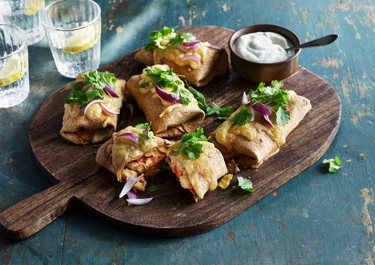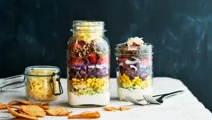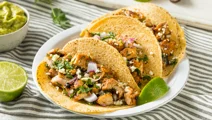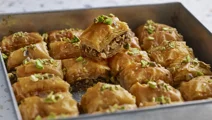
Creamy chicken enchiladas

Instructions
Recommended information
Serving suggestion
Ingredients
Chicken breast fillets | 450 g |
|---|---|
Yellow onion | 1 |
Garlic cloves | 2 |
Red pepper | 1 |
Salt | 1 tsp |
Butter and rapeseed oil | |
Sour cream | 200 ml |
Chilli paste or chilli flakes | 1 tsp |
Medium tortilla bread | 8 |
Grated cheese, gratin | 150 g |
For serving
Sour cream | 300 ml |
|---|---|
Red onion, sliced | 1 |
Fresh coriander |
A creamy chicken filling
Tender chicken smothered in a creamy sauce, wrapped in warm, soft tortillas and topped with melted cheese. Our quick and easy chicken enchiladas deliver a burst of flavour with every bite – it’s a fiesta for your mouth!
A hidden Mexican gem
Originating in Mexico, enchiladas have been around for thousands of years with their roots dating back to the Aztec Empire. Today it is a popular dish around the world.
Unleash your inner fillings
It’s easy to customize your fillings to suit your personal preferences and dietary needs. Other alternatives include beef, cheese, vegetables and seafood.
Enchilada storage tips and tricks
You don’t need to throw away left over enchiladas, simply follow these steps:
- Remove any fresh garnishing (coriander), as this will wilt. Garnish can be added again after reheating.
- Store in the refrigeration or freezer: Let the enchiladas cool to room temperature. Wrap tightly with plastic wrap or foil (for the refrigerator) and place in an airtight container/freezer bag (fridge).
Storage length Refrigerator: Three to four days Freezer: Two to three months
Reheating:
Oven: To reheat refrigerated or frozen enchiladas, preheat your oven to 180 °C.
- Remove the wrapping and place enchiladas in a warmed baking dish. For extra taste, you can add some extra cheese and tomato sauce on top of the enchiladas.
- Cover the dish with aluminium foil and bake for around 20 to 25 minutes (refrigerated) or 30 to 45 (frozen) until hot and bubbly.
- Garnished with fresh ingredients.
Microwave:
- Remove the plastic/foil covering and place the enchiladas in a microwave-safe dish. Cover with a microwave-safe lid
- Heat the enchiladas in the microwave on high power for 2 minutes per enchilada (refrigerated), or 3,5-4 minutes (frozen) depending on the power of your microwave.
- Check the temperature of the enchiladas before serving to ensure they are heated through.
Sides that complement enchiladas
You can’t beat a good guacamole! Other suggestions include Spanish rice, refried beans, salsa, corn on the cob, grilled vegetables (such as bell peppers, zucchini, and onions), black beans, and a salad.
Tips
What kind of tortilla is best for enchiladas?
We recommend the traditional corn tortillas due to its slightly nutty flavour and texture, which stand up well to being baked in sauce. Flour tortillas can also be used, but they tend to be softer and can become mushy. However, if you prefer flour tortillas, lightly fry them before using (see frying instructions below).
Should I fry tortillas before making enchiladas?
While it isn’t necessary for this recipe, shallow-frying tortillas can prevent it from breaking when rolling or becoming soggy (it stops the tortillas from soaking up too much sauce).
To fry tortillas:
- Heat a small amount of oil in a frying pan over medium-high heat.
- Once the oil is hot, carefully place a tortilla in the pan and cook for about 10 seconds per side, or until it is soft and pliable.
- Remove the tortilla from the pan and place it on kitchen paper to drain off any excess oil.
Are enchiladas supposed to be rolled or flat?
Enchiladas can be either rolled or flat, depending on the regional and cultural variations of the dish. Flat enchiladas, also known as enchiladas montadas, are more traditional in Mexico, while the rolled variety are more common in the United States.
Flat enchiladas are made by layering the ingredients in a baking dish, starting with a layer of tortillas, and then a layer of filling (beef, refried beans and then cheese). The process is repeated until the baking dish is full.
Should you cover enchiladas while baking?
Covering enchiladas prevents the tortillas from drying out and helps the cheese melt evenly.
Remember to cover the dish tightly in aluminium foil, to sure there are no gaps or openings where steam can escape.
Why are my chicken enchiladas soggy?
The dreaded soggy bottom! If you have experienced soggy enchiladas in the past, these are the likely culprits:
- Too much sauce: Your sauce may have been too runny, or you used too much, resulting in soggy tortillas. Don’t drown your tortillas in sauce, only use as much as necessary to coat the enchiladas, and make sure it’s thick enough to stick to the tortillas without soaking through.
- Excessive liquid: Always drain excess liquid. Excess moisture from certain ingredients, such as canned corn or even chicken juices, can oversaturate the tortillas.
- Overfilled enchiladas: If the enchiladas are overfilled, the excess filling can seep out and mix with the sauce. To stop your enchiladas from taking an unexpected dip, use a moderate amount of filling and roll the tortillas tightly to prevent seepage.
- Low-quality or undercooked tortillas: Undercooked or low-quality tortillas can become gummy. To prevent this use fresh, high-quality tortillas and fry (see the recipe for frying above) before assembling.











